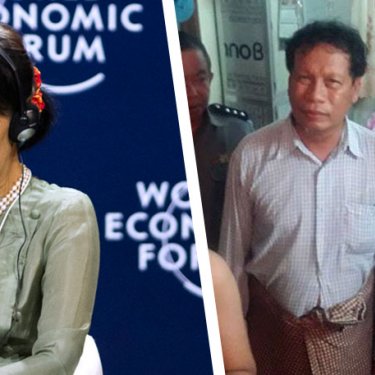RSF deplores excessive jail term for Myanmar columnist

Reporters Without Borders (RSF) calls on the Myanmar authorities to reconsider the seven-year sentence imposed on a columnist close to Myanmar’s former military government for posting comments on Facebook deemed to be hostile to the country’s leader, Aung San Suu Kyi. It also called for the repeal of the archaic sedition law.
Ngar Min Swe was found guilty of sedition on 18 July by a Yangon court for "writing abusive posts on Facebook against State Counsellor Aung San Suu Kyi, making people get the wrong impression of her”, in the words of the court spokesman.
Ngar Min Swe, who used to write for the pro-government newspaper Global New Light of Myanmar, was arrested on 12 July, after posting a comment on Facebook that day criticising a kiss on the cheek received by Aung San Suu Kyi from Barack Obama during a visit to Myanmar four year ago by the former US president. At the time, she was a reformist member of the Myanmar parliament.
The disparaging remark was the latest in a long series of critical comments by Ngar Min Swe, who was close to the military-backed government and a critic of the former dissident, now the head of the government.
He was convicted two weeks after two Reuters journalists, Kyaw Soe Oo and Wa Lone, were each sentenced to seven years’ imprisonment for investigating a massacre of 10 Rohingya civilians by soldiers and militiamen. The fact that the two trials were held in close succession, and that the sentences handed down in both cases were the same, raises questions about the extent to which the security forces manipulate the judicial system.
Scapegoats
By convicting an anti-reform and pro-junta figure, the military establishment may hope to make a goodwill gesture towards the international community after the harsh criticism that followed the arrest of the two Reuters reporters. Inside the country, the media coverage of the case could repair the damage to Aung San Suu Kyi’s image as an icon of democracy. Some people have begun to question her silence in the case of the Reuters journalists.
“However unacceptable the conviction of the two Reuters reporters may be, the sentence imposed on the columnist Ngar Min Swe is totally disproportionate,” said Daniel Bastard, the head of RSF’s Asia-Pacific desk.
“His posts hostile to Aung San Suu Kyi’s reform movement may have been questionable, but the sentence he has received sets a worrying precedent. It raises serious doubts about the independence of the judicial system in Myanmar. For this reason, we are requesting an immediate review of the charges against him. Above all, it is high time the government repealed the archaic law on sedition that was used to convict him.”
Manipulation of the law
Like the secrecy law used to convict Wa Lone and Kyaw Soe Oo, the law on sedition dates from the British colonial era. In Myanmar, as well as India, Malaysia and Singapore for example, laws on sedition are used a pretexts by the authorities to silence criticism by journalists. They provide for penalties of up to life imprisonment.
Myanmar has fallen six places in the 2018 World Press Freedom Index compiled by RSF and is now ranked 137th of 180 countries.



